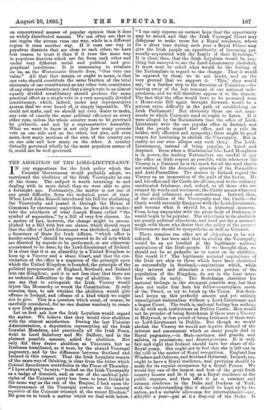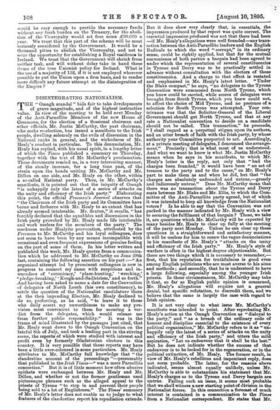.1.1ih, ABOLITION OF THE LORD-LIEUTENANCY.
IN our suggestions for the Irish policy which the Unionist Government would probably adopt, we mentioned the abolition of the Irish Viceroyalty as one of the items. The subject is worth returning to and dealing with in more detail than we were able to give a fortnight ago. Fortunately, the matter is not one of any great difficulty, from the technical point of view. When Lord John Russell introduced his Bill for abolishing the Viceroyalty and passed it through the House of Commons by enormous majorities, he was able to under- take the overthrow of what Joseph Hume called "the symbol of separation," by a Bill of very few clauses. As a matter of fact, however, the change might be accom- plished by a Bill with but one clause, which should enact that the office of Lord-Lieutenant was abolished, and that a Secretary of State for Irish Affairs, "which office is hereby created," should be empowered to do all acts which are directed by statute to be performed, or are otherwise accustomed to be done, by the Lord-Lieutenant of Ireland. It is clear that it is an absurdity in a United Kingdom to keep up a Viceroy and a sham Court, and that the con- tinuation of the office is a negation of the principle upon which the United Kingdom is founded, the principle of the political incorporation of England, Scotland, and Ireland into one Kingdom; and it is not less clear that there are no technical difficulties in the way of abolition. No one can say that to extinguish the Irish Viceroy would injure the Monarchy or wreck the Constitution. It only remains, then, to ask whether the abolition would give offence in Ireland, and offence of a kind which we ought not to give. This is a question which must, of course, be carefully considered, for no one desires wantonly to create a new Irish grievance.
Let us first ask how the Irish Loyalists would regard the matter. We believe that they would view abolition with the utmost satisfaction. During the last Unionist Administration, a deputation representing all the Irish Loyalist Members, and practically all the Irish Peers, went to Lord Salisbury and Mr. Balfour, and in the plainest possible manner, asked for abolition. Not only did they desire abolition as Unionists, but as Irishmen humiliated, as it were, by the absurd Viceregal pageantry, and by the difference between Scotland and Ireland in this respect. That the Irish Loyalists remain of the same way of thinking, is clear from the letter which Colonel Saunderson contributes to the Times of Thursday. "I have always," he says, "looked on the Irish Viceroyalty as a badge of disunion, and, as one of the cardinal prin- ciples of the Unionist party has been to treat Ireland in the same way as the rest of the Empire, I look upon the disappearance of the Viceregal system as the natural eequatur of the Unionist triumph at_the recent Election." He goes on to touch a matter which we deal with below. "I can only express an earnest hope that the opportunity may be seized, and that the Irish Viceregal Court may disappear to make room for a Royal residence, where for a short time during each year a Royal Prince may give the Irish people an opportunity of becoming per- sonally acquainted with the family of their Sovereign." It is clear, then, that the Irish Loyalists would be any- thing but annoyed to see the Lord-Lieutenancy abolished. It must next be asked what would be the feeling of the Nationalists in regard to the change. That it would be opposed by them, we do not doubt, and on the very ground that we support it. ' This,' they would say, is a further step in the direction of Unionism—the tearing away of the last remnant of our national inde- pendence, and we will therefore oppose it to the utmost. The fact that the office would have to be recreated were a Home-rule Bill again brought forward, would be a serious extra difficulty in the path of establishing an Irish Parliament.' But obviously these are not argu- ments to which Unionists need or ought to listen. If it were alleged by the Nationalists that the office of Lord- Lieutenant were the one popular office in Ireland, and that the people regard that office, and as a rule its holder, with affection and sympathy, there might be good reason for hesitating to abolish the Viceroyalty. But in reality no one ever alleges any such thing. The Lord. Lieutenancy, instead of being popular, is hated and despised. Even when a Gladstonian like Lord Houghton is in power, the leading Nationalists are careful to pay the office as little respect as possible, while whenever the Viceroy is a Unionist he is the mark for all the mud that is not wanted for the domestic quarrels of the Parnellites and Anti-Parnellites. The masses in Ireland regard the Viceroy as an incarnation of the guilt of the Saxon. He and his office and the Castle are all one, and to the ordinary uneducated Irishman, and, indeed, to all those who are swayed by words and sentiment, the Castle means whatever is cruel and infamous, and anti-national. Instead, then, of the abolition of the Viceroyalty and the Castle—the Castle would naturally disappear with the Lord-Lieutenant, and become what it should be, a historical museum. From being unpopular with the great body of Irishmen, it would begin to be popular. The objections to its abolition are purely political objections, and need not for a moment weigh with those who desire that the policy of the present Government should be sympathetic as well as Unionist.
There remains one other set of objections to be con- sidered. It has been said that to abolish the Viceroyalty would be an act levelled at the legitimate national aspirations of the Irish people. If we thought that, we should not be so pedantic as to insist on its abolition. But would it ? The legitimate national aspirations of the Irish are akin to those which have been cherished so successfully in Scotland,—aspirations which, while they interest and stimulate a certain portion of the population of the Kingdom, do not in the least inter- fere with its unity. The Scotchman cherishes his national feelings in the strongest possible way, but that does not make him hate his fellow-countrymen south of the Tweed, or try to break up the Union. But Scot- land keeps up this perfectly sincere and yet entirely unmalignant nationalism without a Lord-Lieutenant and a bogus Court. The truth is, national feeling has nothing to do with such institutions as Dublin Castle. Men would not be prouder of being Scotchmen if there were a Viceroy at Holyrood, or less proud of being Irishmen if there were no Lord-Lieutenant in Dublin. But though we would abolish the Viceroy we would not deprive Ireland of the interest and amusement which so many people find in Royal pageantry,—in State-carriages, and guards, and salutes, in processions, and drawing-rooms. It is only fair and right that Ireland should have her share of the Royal pomp. She ought not to feel that she is left out in the cold in the matter of Royal recognition. England has Windsor and Osborne, and Scotland Balmoral. Ireland, too, ought to have a Royal residence, and provision should be made for its regular occupation by a Royal Prince. We would buy one of the largest and best of the great Irish country houses and fit it up as a Royal residence at the public expense, and then offer it as a summer and autumn residence to the Duke and Duchess of York, with the understanding that it should be kept iff by the nation, and a suitable allowance for entertainment-:--say, £10,000 a year—put at tie disposal of the Duke. It would be easy enough to provide the necessary funds without any fresh burden on the Treasury, for the aboli- tion of the Viceroyalty would set free some £30,000 a year. We trust that this part of the scheme will be most seriously considered by the Government. It would be a thousand pities to abolish the Viceroyalty, and not to seize the opportunity for establishing a Royal residence in Ireland. We trust that the Government will shrink from neither task, and will without delay take in hand these items of the true Unionist policy for Ireland. What is the use of a majority of 152, if it is not employed wherever possible to put the -Union upon a firm basis, and to render more difficult any future attempt at the disintegration of the Empire ?



































 Previous page
Previous page